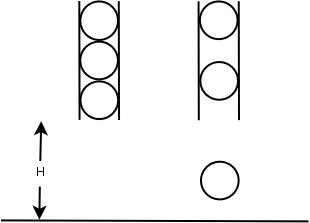POJ3684-Physics Experiment 弹性碰撞
Posted the-way-of-cas
tags:
篇首语:本文由小常识网(cha138.com)小编为大家整理,主要介绍了POJ3684-Physics Experiment 弹性碰撞相关的知识,希望对你有一定的参考价值。
| Time Limit: 1000MS | Memory Limit: 65536K | |||
| Total Submissions: 3576 | Accepted: 1270 | Special Judge | ||
Description
Simon is doing a physics experiment with N identical balls with the same radius of R centimeters. Before the experiment, all N balls are fastened within a vertical tube one by one and the lowest point of the lowest ball is H meters above the ground. At beginning of the experiment, (at second 0), the first ball is released and falls down due to the gravity. After that, the balls are released one by one in every second until all balls have been released. When a ball hits the ground, it will bounce back with the same speed as it hits the ground. When two balls hit each other, they with exchange their velocities (both speed and direction).

Simon wants to know where are the N balls after T seconds. Can you help him?
In this problem, you can assume that the gravity is constant: g = 10 m/s2.
Input
The first line of the input contains one integer C (C ≤ 20) indicating the number of test cases. Each of the following lines contains four integers N, H, R, T.
1≤ N ≤ 100.
1≤ H ≤ 10000
1≤ R ≤ 100
1≤ T ≤ 10000
Output
For each test case, your program should output N real numbers indicating the height in meters of the lowest point of each ball separated by a single space in a single line. Each number should be rounded to 2 digit after the decimal point.
Sample Input
2 1 10 10 100 2 10 10 100
Sample Output
4.95 4.95 10.20
题意:N个半径为R厘米的小球排在距离地面高度H米的管道里,将小球释放,每个球间隔一秒,问T秒后,每个小球距离地面的高度。(球与球,球与地面的碰撞都是弹性碰撞)
思路:先考虑单个球的情况,小球需要t=sqrt(2*H/g)秒才能落地,令k=T/t;小球离地面的距离设为y
y=H-0.5*g*(T-kt)^2 ,k是偶数
y=H-0.5*g*(kt+t-T)^2 ,k是奇数
考虑多个小球,因为是弹性碰撞,所以可以认为两个小球没有碰撞,直接穿过
#include <iostream> #include <stdio.h> #include <string> #include <string.h> #include <algorithm> #include <math.h> #define fio ios::sync_with_stdio(false);cin.tie(0);cout.tie(0) #define maxn 109 using namespace std; int c; int n, T; int h, r; double y[maxn]; double calh(int i) { int ralT = T - (i - 1); if (ralT < 0) return h; double t = sqrt(h / 5.0); int k = (int)(ralT / t); double y; if (k % 2 == 0) { y = h - 5.0 * (ralT - k * t)*(ralT - k * t); } else { y = h - 5.0 * (k * t + t - ralT)*(k * t + t - ralT); } return y; } int main() { cin >> c; while (c--) { cin >> n >> h >> r >> T; for (int i = 1; i <= n; i++) { y[i] = calh(i); } sort(y + 1, y + 1 + n); for (int i = 1; i<n; i++) { printf("%.2f ", y[i] + 2 * r*(i - 1) / 100.0); } printf("%.2f ", y[n] + 2 * r*(n - 1) / 100.0); } return 0; }
以上是关于POJ3684-Physics Experiment 弹性碰撞的主要内容,如果未能解决你的问题,请参考以下文章